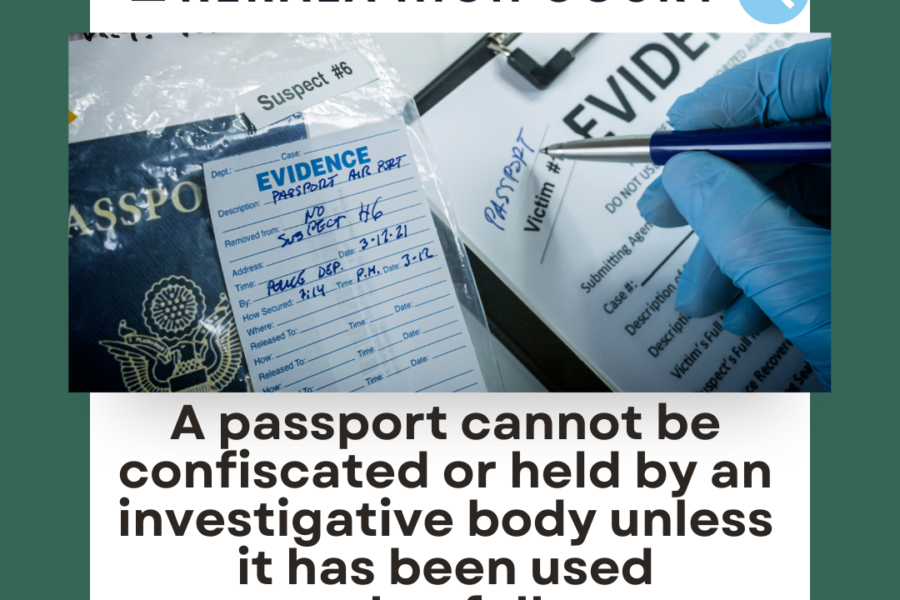Davood v. State of Kerala
According to a recent ruling by the Kerala High Court, the passports of suspects cannot be seized or kept by investigating agencies unless they were used—or are suspected of having been used—to commit a crime.
Judge Bechu Kurian Thomas noted that it is improper for investigative agencies to keep a passport for an extended period since that would be equivalent to impounding it.
“The passport of an individual is an important document and is issued under the provisions of the Passports Act, 1967. In the absence of any crime committed or suspected to have been committed with the said document, a passport cannot be seized or retained by the investigating agencies. The long retention of a passport without even a condition in the bail order will amount to impounding, which is opposed to the law,” the Court held.
The Supreme Court’s ruling in Suresh Nanda v. CBI, held that while law enforcement may confiscate passports under Section 102(1) of the Code of Criminal Procedure (CrPC), the Passport Authority alone is authorised to impound passports under Section 10(3) of the Passports Act, 1967, was cited by the Court in reaching its decision.
It was mentioned that the highest court had also highlighted that a document is not the same thing as its impoundment when it is seized.
If a document is seized and kept for a certain amount of time, that retention is equivalent to impounding the document or property. In addition, the Supreme Court noted that section 104 of the Cr.P.C. does not allow the court to seize a passport because it would allow the court to seize any document or object, not just passports,” the High Court stated.
A petitioner who was detained in April 2022 under the Narcotic Drugs and Psychotropic Substances Act, 1985, claimed to have received a package containing 3.5 kilograms of hashish.
After being freed on bond for a month, he filed a request to have his passport, ID card, and cell phone—all confiscated by the police during his arrest—released before the Sessions Court in Ernakulam.
But the Sessions Court denied his request, pointing out that one of the terms of the release was that the petitioner may not leave the State of Kerala without the trial court’s approval. Furthermore, it was noted that he might abuse the materials if the identity card and other items were returned.
This prompted him to file a motion with the High Court, claiming the respondent authorities could not keep the confiscated documents because they were unrelated to the alleged crime. Furthermore, since the passport had nothing to do with the claimed crime, it was contended that the seizure of it was illegal.
The petition was denied by the attorney for the Narcotics Control Bureau, which is looking into the matter. It was contended that the accused’s cell phone needed to be submitted for forensic examination and that giving his passport and identity card away would only help the petitioner evade the law.
The petitioner’s passport was not required to be deposited with the investigating officer or the court, as the High Court pointed out in its ruling granting him bail.
“The restriction that petitioner shall not travel outside Kerala without permission from the Court cannot be a reason to retain his passport,” the Court stated.
Regarding the cell phone, the Court ruled that since it was taken in April 2022, the forensic examination should have been completed by now. The Court also noted that the petitioner’s identity card would not be helpful to the investigation.
As a result, the court granted the petition and instructed the investigative agency to give the petitioner access to their identity card, passport, and cell phone.
Adv. Khanak Sharma

